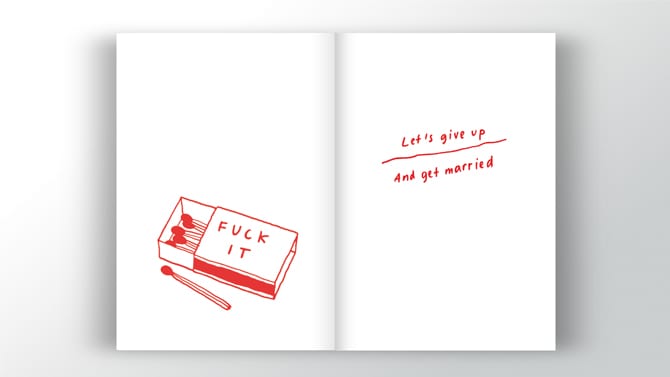From German publisher Rotopol comes Nadine Redlich's hilarious little book I Hate You — You Just Don't Know It Yet. This is her third collection of strips and drawings. Her first, Ambient Comics, established her as an artist who loves to use the grid to play with time and set up subtle jokes. Ambient music is designed to relax someone with a series of sounds aimed at different kinds of brainwave activity, and so too seem her ambient comics about following images through a grid. There's a candle melting, an inchworm moving, and a shadow moving. However, Redlich starts to slowly subvert these images in funny ways. In one, there are six panels of the earth taken from space, where there is no doubt a great deal of change going on on the planet in each of the six panels, but it's so far away that we only see the same image six times. The best example is the image of an alpine mountain peak, with an avalanche forming over the six panels. The irony of meditating and being in the present with destruction is exactly the kind of paradox that informs her work. Her second book, Paniktotem, does something similar, this time pairing extremely cute images with scenarios related to anxiety, frustration, and meaninglessness.
I Hate You – You Just Don't Know It Yet is a mixture of comics, doodles, scrawled aphorisms, and scorched earth destruction of romantic cliches. Every word drips with sarcasm, yet the book also has an emotional heft to it that gives power to its humor. The book is balanced between running gags that skewer platitudes, funny drawings of people with bulbous noses, and genuine expressions of rage, loneliness and despair hidden in the jokey quality of the material. Redlich runs sentimental lines like “You have the most beautiful body shape I've ever seen” and “Our love is like a beautiful vase” repeatedly throughout the book and juxtaposes them against increasingly absurd images. The funniest drawing connected to the first line is simply a sack tied off at the top, and the most amusing illustration of the latter is just a toilet. These are funny in a long-form improv kind of way, but they also reminded us that at its core, this series of notes and observations is about both a relationship disintegrating and one person's very conception of love falling apart.

What Redlich is doing here is deconstructing romance, positioning it as a destructive force. There's an image of a sunset over an ocean meant to evince a Hallmark card in terms of the heartstrings it's supposed to be pulling. The text reads, “I wish I could go back in time to our first kiss and puke into your mouth.” Romance is not just false but inherently dehumanizing. Compare that to her strips captioned “Better Than Talking” that include six panels of two people throwing a frisbee back and forth, or six panels in the dark of sex noises. The final entry in that series is six panels with just the word “Everything” in them. Romance is filling people into a certain prescribed slot in one's life, where the person matters less than the fact that a role is filled. The fact that we're bombarded with such images in our culture and from our families only goes to further the yearning to be the star of your own romance, since we're told that our lives are incomplete if we don't.

That stinks of an artificially designed form of desperation that plays on a natural feeling of not wanting to be alone, which conflicts with a natural need to be alone sometimes. Those conflicting feels are shown in one page with an open box full of matches, with the words “Fuck it” on the box. That's a desire to burn everything down, to wipe the slate of one's life entirely clean, and to burn bridges behind you. On the very next page is the phrase “Let's give up/ And get married.” That can be interpreted in a number of different ways. On the one hand, it's giving into cultural pressure to be bonded to someone, presumably for life. It's a way of locking in someone such that you are no longer alone. On the other hand, it's a way of giving up in the sense of ceasing hostilities between two warring factions. It's a mutual acceptance and understanding that relationships are imperfect and messy, and deciding to get together anyway instead of seeking out perfection that doesn't exist.
The visceral and immediate are more important than romantic concepts. Those things that we can experience in the moment are what accumulate into the experience of being with someone. Redlich distrusts language as a tool of romantic nonsense and an enabler of illusory concepts. At the same time, as expressed in her “me/you” diagrams, there's something inherently dangerous in making yourself vulnerable to someone else. You're essentially at the mercy of their whims, be they cruel or kind. It can also be a way of handing power over to someone else, which is why these diagrams often feature a huge “You” and a tiny “Me.” The alternative, bricking oneself off like in the “Boundaries” strips, is its own kind of punishment. The book ends, naturally on a fart joke that followed up on an earlier fart joke. That came after a picture of a flower labeled “Futile.” It's both futile to try to be with someone and futile not to try. Redlich's book is a way of shaking one's head, laughing at this futility, and doing it anyway without any romantic delusions.







